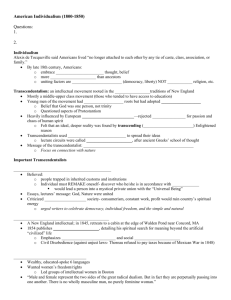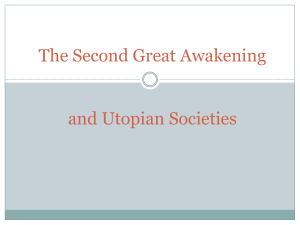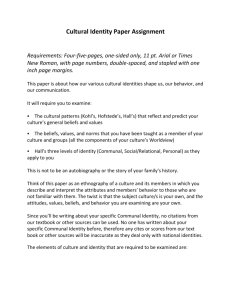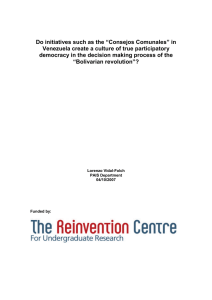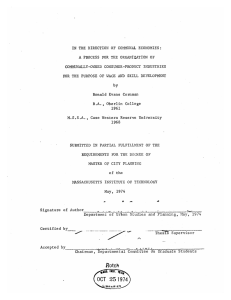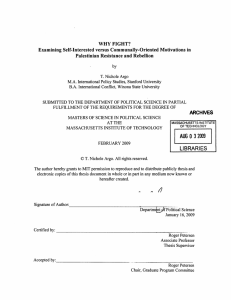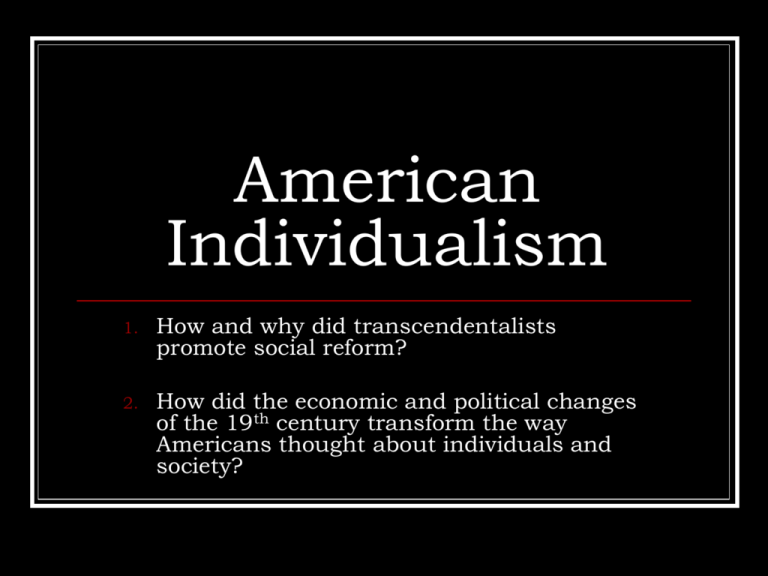
American
Individualism
1.
How and why did transcendentalists
promote social reform?
2.
How did the economic and political changes
of the 19th century transform the way
Americans thought about individuals and
society?
Think….
How did new ideas that emerged
during this era contribute to American
culture and values today?
What was going on in America between
1800-1850?
American Individualism
Alexis de Tocqueville said Americans
lived “no longer attached to each other
by any tie of caste, class, association,
or family.”
By late 18th century, Americans:
embrace individual thought, belief
more solitary than ancestors
Uniting factors are broad ideas (democracy,
liberty, equality) NOT shared religion, etc.
Transcendentalism
An intellectual movement rooted in the
religious traditions of New England
Young men of the movement had Puritan
roots but had adopted Unitarianism
Belief that God was one person, not trinity
Questioned aspects of Protestantism
Heavily influenced by European
Romanticism—rejected rationalism for
passion and chaos of human spirit
Felt that an ideal, deeper reality was found by
transcending (moving beyond) reason
Transcendentalism
Transcendentalists used public lectures to
spread their ideas
Message of the transcendentalist: inner
change and self-realization
lecture circuits were called Lyceums, after ancient
Greeks’ school of thought
Focus on connection with nature
Mostly a middle-upper class movement (those who
tended to have access to education)
Ralph Waldo Emerson
People trapped in
inherited customs
and institutions
Individual must
REMAKE oneselfdiscover who he/she
is in accordance
with nature
would lead a person into a
mystical private union with
the “Universal Being”
Ralph Waldo Emerson
Essays, lectures’
message: God, Nature
were united
Criticized new industrial
society- consumerism,
constant work, profit
would ruin country’s
spiritual energy
urged writers to celebrate
democracy, individual
freedom, and the simple
and natural
Henry David Thoreau
New England intellectual
1845, retreats to a cabin
at the edge of Walden
Pond near Concord, MA
1854 publishes Walden,
detailing his spiritual
search for meaning
beyond the artificial
“civilized” life
Henry David
Thoreau
“I went into the woods
because I wished to live
deliberately, to front only
the essential facts of life,
and see if I could not learn
what it had to teach, and
not, when I came to die,
discover that I had not
lived.”
Emphasizes self-reliance
Social Non-conformity
Civil Disobedience
(against unjust lawsThoreau refused to pay
taxes because of
Mexican War in 1848)
Thoreau Quotes…
“Simplicity, simplicity, simplicity! I say, let
your affairs be as two or three, and not a
hundred or a thousand; instead of a million
count half a dozen, and keep your accounts
on your thumbnail."
I would rather sit on a pumpkin and
have it all to myself,
than be crowded on a velvet cushion.
Margaret Fuller
Wealthy, educatedspoke 6 languages
Wanted women’s
freedom/rights
Led groups of
intellectual women in
Boston
“Male and female represent
the two sides of the great
radical dualism. But in fact
they are perpetually passing
into one another. There is no
wholly masculine man, no
purely feminine woman.”
Woman in the Nineteenth
Century, 1845
Walt Whitman
Often called the
“father of free verse”
controversial,
particularly his poetry
collection Leaves of
Grass, considered
obscene for its
sexuality
The individual had a
divine spark
Break free from
tradition, law, social
restraints to discover
an “original relation
with nature.”
Walt Whitman Quotes
“Sex contains all, bodies, souls,
Meanings, proofs, purities, delicacies, results, promulgations,
All hopes, benefactions, bestowals, all the passions, loves,
beauties, delights of the earth,
All the governments, judges, gods.”
“I am the poet of the woman the same as the man,
And I say it is as great to be a woman as to be a man,
And I say there is nothing greater than the mother of
men.”
Darker Visions
Nathaniel Hawthorne
Herman Melville
The Scarlet Letter
Moby Dick
Addressed opposition
between individual
transcendence and
necessity for social order
Warned of dangers of
excessive individualism
Ego=downfall
Rural
Communalism &
Urban Culture
1.
Why did communal settlements increase
during the mid-18th century?
2.
What were objectives of communal
participants? Why?
Brook Farm Experiment
Brook Farm (West Roxbury, MA) was a
transcendentalist communal society experiment by
Unitarian minister George Ripley
Utopia—an ideal community meant to create a
perfect socio-politico-legal system
These communal societies a.k.a utopias
hoped this utopia would allow members to realize their
spiritual and moral potential
describes intention of real-life intentional communities
and fictional societies in literature
Philosophy: once freed from tension and demands of a
competitive, urban society, members could develop
themselves fully
Brook Farm Experiment
Communalism
Although Brook Farm fails,
thousands join other communal
settlements (mostly in rural NE,
Midwest)
symbols of social protest
socialist in nature: communal ownership or
property
experiment in challenging traditional
marriage, family life, gender roles, capitalist
values
Shakers (Albany, NY)
Founded by Ann Lee Stanley
after she had a vision about
human sin
Believed that everybody could
find God within him or herself,
(individualism) rather than
through clergy or rituals
The Shakers tended to be
more emotional in their
worship (“shakers” refers to
the dances during worship)
believed life should be
dedicated to pursuing
perfection and end sins
Shakers
20 communal settlements with 200,000 converts in 19th century.
Believed in strict celibacy, no marriage, as sex was considered the
greatest sin
Believed God was both male and female
Sexual equality, reject traditional gender roles
conversion and adoption of orphans to keep numbers (decrease 1850s)
Many did not stay; most at any time was 6,000 in 1840
Allowed people of all backgrounds, including Africans
Focus was on craftwork (furniture) and agriculture
Charles Fourier
(Fourierist Movement)
French by birth,
embraced utopian
socialism—work for the
benefit of the community
Workers paid based on
their contributions in
groups called phalanxes
Jobs based on individual
interests, desires
Rejected capitalism,
industrialization, trade
Fourier on Women
Supports women's rights, individuality, rejected
idea of “separate spheres” where women were
considered inferior
all jobs should be open on basis of skill/ability, not
gender
Saw traditional marriage could hurt women's
rights as human beings; he never married
Concerned with liberating every individual through
education and human passion (expression)
Ideas spread to America through Arthur
Brisbane’s book, The Social Destiny of Man
Communities like Utopia, Ohio, fail by 1860s (social
policy, impact of depression, lack of religious
reasons)
John Humphrey Noyes:
the Oneida Community
Noyes argued that
Fourier communities
failed because they
lacked morality/faith
(religion)
Egalitarianismeveryone EQUAL (men
and women)
Embraced Perfectionism
(sin free!)
Oneida Community
Marriage= hindered peace/sin free life
Challenged traditional sexual and gender roles
Complex marriages: rejection of monogamy creates
criticism (& laws regarding adultery)
Women cut hair short and wore pants
Successful community- made steel animal traps and
eventually silverware (joint-stock company)
Children raised communally to give most women time
for self-development
Women=full participants in community= complete
equality
marriage, child rearing= kept women down
Joseph Smith and Mormonism
Joseph Smith, Jr.
disturbed by many
Christian
denominations
1820 as a child: God
appeared in a vision;
told him to avoid
denominational
churches
History of Mormonism
1823, age 17: angel
called Moroni, the son of
Mormon, appeared to
Smith
Told he was chosen to
translate the book of
Mormon, written on
golden plates hidden in
New York
1827: begins translation;
published in 1830 as
The Book of Mormon
Creates Mormon
movement
Religion deviates from
Christianity
Polytheism, polygamy
persecution forced them
to move from New York
to Ohio, Missouri,
Illinois
They ended up in Salt
Lake and founded
Salt Lake City
All in all….
These alternative communities were
important:
questioned traditional customs
challenged emerging class divisions
challenged sexual norms in the new
capitalist society
They were “countercultural blueprints
for a more egalitarian society.”
Just to Review
Name of
Settlement
Philosophy
Social Structure Legal System
Economic
System
Shakers
Christian
perfectionism
Men and
women equal
and sexless
Religioncelibacy
Furniture
Fourier
Phalanxes
Utopian
Socialism
Rich/poor but
communal
Social Mores
Mixed
Oneidas
Marriage=
complex,
Perfection can
be achieved
Polygamy
Complex Marriage
Communal living
Egalitarian
Religionperfectionism
Steel traps and
silverware
Mormons
Belief that
theirs is the
true Christianity
Polygamy
Religion
Mixed
Brook Farm
Transcendentalism
egalitarian
Social Mores
Farming

